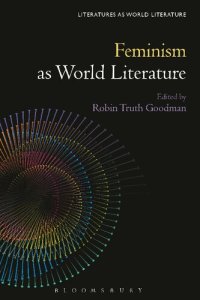
Ebook: Feminism as World Literature
Author: Robin Truth Goodman (editor)
- Series: Literatures as World Literature
- Year: 2022
- Publisher: Bloomsbury Academic
- Language: English
- pdf
The conventional lineage of world literature starts with Goethe and moves through Marx, Said, Moretti, and Damrosch, among others. What if there is another way to trace the lineage starting with Simone de Beauvoir and moving through Hannah Arendt, Julia Kristeva, and Gayatri Spivak? What ideas and issues get left out of the current foundations that have institutionalized world literature, and what can be added, challenged, or changed with this tweaking of the referential terminology?
While feminism has always been a worldly endeavor, the field of world literature seems to skirt away from considering feminism and applying this First-World category to non-First-World contexts. Feminism as World Literature challenges the spatial concept of world literature by reorienting the field’s central directions and concerns. Just as "economy" is currently thought of in terms of global circulation, domination, and power but was once a word noting "household management," other ideas built into world literature and its criticism are viewed here by feminist framings, including the environment, technology, immigration, translation, work, race, governance, image, sound, religion, affect, violence, media, future, and history. In other words, this volume looks to readings and modes of reading that expose how the historical worldliness of texts allows for feminist interventions that might not sit clearly or comfortably on the surfaces.
While feminism has always been a worldly endeavor, the field of world literature seems to skirt away from considering feminism and applying this First-World category to non-First-World contexts. Feminism as World Literature challenges the spatial concept of world literature by reorienting the field’s central directions and concerns. Just as "economy" is currently thought of in terms of global circulation, domination, and power but was once a word noting "household management," other ideas built into world literature and its criticism are viewed here by feminist framings, including the environment, technology, immigration, translation, work, race, governance, image, sound, religion, affect, violence, media, future, and history. In other words, this volume looks to readings and modes of reading that expose how the historical worldliness of texts allows for feminist interventions that might not sit clearly or comfortably on the surfaces.
Download the book Feminism as World Literature for free or read online
Continue reading on any device:

Last viewed books
Related books
{related-news}
Comments (0)